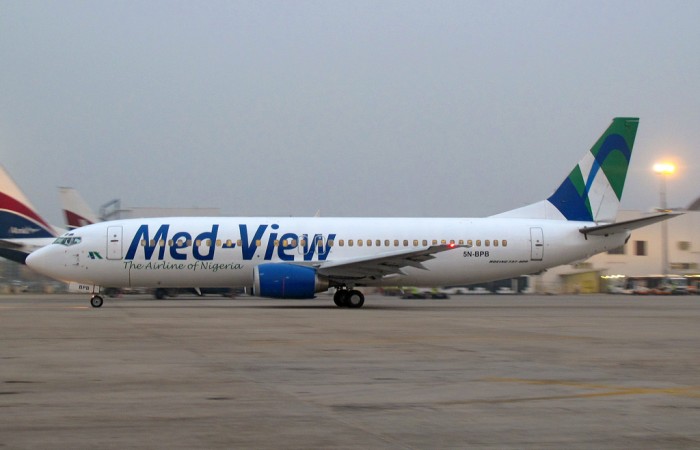- Med-View Airline’s Turnover Hits N26bn in Five Years
Med-View Airline Plc said it grew its turnover by 622.2 per cent to N26bn from N3.6bn in the past five years.
The airline, which was listed on the Nigerian Stock Exchange by introduction, on Tuesday, said it was coming to the market to raise working capital and further grow shareholders’ value.
“We have been able to operate successfully for 10 years. We have a very clean record and have grown turnover from N3.6bn to 26bn in five years,” the Managing Director/Chief Executive Officer of the company, Alhaji Muneer Bankole, said in his address at the Nigerian bourse.
On why the company decided to list on the Exchange, Bankole reiterated that the firm was seeking to enhance its corporate value and brand image.
In addition, he said the airline wanted better access to long-term capital from wide range of local and international investors; better clout and rating when obtaining loans from financial institutions.
This was also to boost the international image and profile of the company, as well as improve its corporate governance and accountability.
According to him, the company is projecting to grow its revenue from N31.432bn in 2017 to N58.491bn by 2020.
Commenting, the Chief Executive Officer, NSE, Oscar Onyema, said Med-View had taken strategic steps to list on the NSE, which further reinforced “our belief; in spite of several policy and economy challenges in the nation, our platform remains one of the best venues for raising capital and encouraging an enabling sustainable growth for national development.”
He noted that despite the challenging operating environment in the aviation industry in Nigeria and globally, the air transport industry had continued to contribute $10bn to gross domestic product of Africa countries and “it is projected that close to six million jobs would be supported by Africa air transport sector over the next 20 years.”
Onyema confirmed that Med-View Airline met the listing standards of the NSE, saying that with the listing, the company was showing its commitment to a culture of strong corporate governance, excellence, professionalism and efficient services to its passengers as well as guaranteeing increased return to its shareholders.
Also speaking at the forum, the Minister of State for Aviation, Senator Hadi Sirika, said there was a huge potential and opportunity within the sector of aviation, especially looking at tourism connecting businesses, places and people.
He said it was very important for the sector to experience growth and development and make the Nigerian economy more robust.
Sirika said, “I believe that this time around, finding capital will not be difficult and government will encourage the sector with favourably policies targeted at also expanding the economy.”
“We can achieve a lot through tourism as a nation. Kenya for example is living on tourism which has empowered many indigenous companies. No doubt, a lot of countries are boosting their revenue through tourism.”
He said stakeholders in the country’s aviation sector were doing everything within their powers to ensure that the industry developed and increased capacity to provide the needed service in such a manner that is standardised.
“Aviation in particular is regulated worldwide and what we are doing is to ensure we align our self to provide services that are internationally recognised and accepted within international principle,” the minister added.


 Naira4 weeks ago
Naira4 weeks ago


 Naira4 weeks ago
Naira4 weeks ago




 Naira4 weeks ago
Naira4 weeks ago




 Naira3 weeks ago
Naira3 weeks ago
 Commodities4 weeks ago
Commodities4 weeks ago


 News4 weeks ago
News4 weeks ago
 Travel4 weeks ago
Travel4 weeks ago




 Naira3 weeks ago
Naira3 weeks ago





















